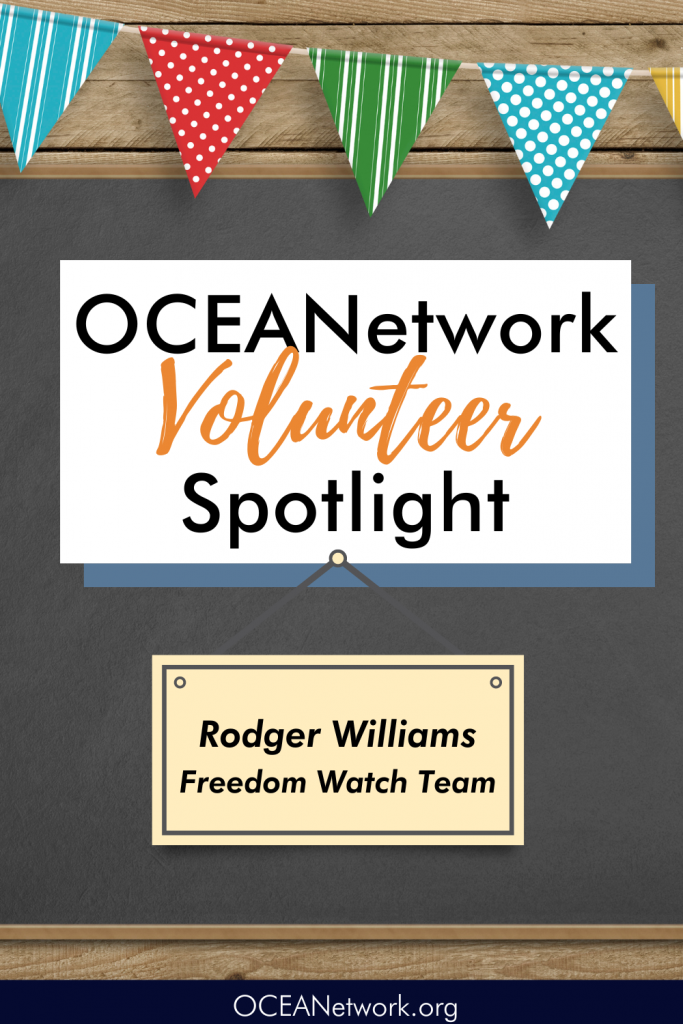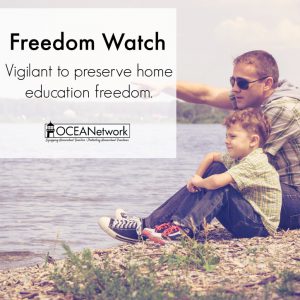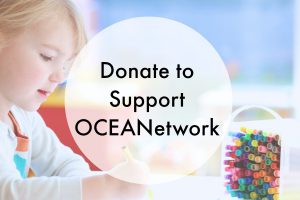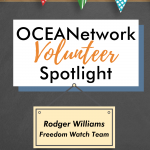Oregon homeschoolers have benefited greatly from the dedicated work of Rodger Williams, OCEANetwork’s lead legislative liaison and member of our Freedom Watch Team. Learn more about him from our recent interview, transcribed below!

OCEANetwork: Rodger, thank you for taking the time to do this. We really want our constituents to get to know who you are. Tell us a little bit about when you decided to start homeschooling.
Rodger: When our oldest was 5 we listened to Focus on the Family, James Dobson, and he was doing a series of programs on homeschooling. I thought, “Wow! Yes, let’s do it!” And Karen said, “I’m not so sure.” We tried it and, like for a lot of homeschool moms, it was hard for her. She didn’t think she was doing a good enough job. As you know, there they are, doing outstanding work, they think they’re a failure and their kids turn out not only fine, but whole. That’s how we got started.
OCEANetwork: When did you first become involved with OCEANetwork?
Rodger: We were on their mailing list back in those days, and it was not internet mail it was post office mail. And there was an alert they were getting out and they invited people to come and help fold stamp mailings. I showed up, and I was kind of a political activist at the time, and they got to know me and a little later they asked Karen and me to be on the board.
OCEANetwork: What led you to become involved with lobbying efforts for Oregon homeschoolers?
Rodger: OCEANetwork had bills down at the legislature. At that time testing was required every year and if you were below the 15th percentile then you were in the penalty box like now, but you were REALLY in the penalty box then. Today [as a result of our later bill that passed] if you get in the penalty box, the child’s score has to decline twice in a row before they can remand them to school. So I got involved in that effort. I wasn’t a leader at that point, but I was down there at Salem.
That bill failed and the next year we had another bill and I was really active in that one. We added to the proposed bill that a child could have double declining scores before being remanded. I played a very major role that year. I was dealing with the Department of Education, and I was also dealing with the Governor’s education aide. I was not the only one, but I had a very major role. That bill passed in 1999 and I’ve been active ever since.

OCEANetwork: What’s keeping you involved in working for homeschool freedom?
Rodger: It’s important! For Christians, homeschooling is a tool to disciple your children, to provide a safe environment. And others do it for that safe environment for their particular reasons. And frankly, if I’m going to defend Christian homeschoolers I have to defend (and I don’t mean ‘have to’ in the sense that I don’t like it) but it’s necessary to defend every single homeschooler in Oregon. And today we’ve got a broader range of homeschoolers than ever in history, here in Oregon and nationwide. So the Lord lets me do this! This is my assignment! And I’m somewhat good at it and I think it’s important that I continue as long as I can.”
OCEANetwork: Tell us the part that you played when the Oregon Administrative Rules were written for home education.
Rodger: My involvement with the 1999 bill preceded the rules. The way it works at the legislature is when a bill that the legislature passes and the governor signs or allows to become a law, a government agency, in our case it’s the Oregon Department of Education, works out the administrative rules to implement and interpret the statute. It’s actually a dangerous process because sometimes these state bureaucracies will write administrative rules that flatly go opposite of what the law or what the statute says. I don’t know how they can do it and get away with it, but they do. It’s fraught with danger.
The Oregon Home Education Network people and OCEANetwork worked together. We worked together closely during the statute process as well, and for certain things I was the spearhead. As far as the administrative rules are concerned, a committee met. It was the OHEN representative, several OCEANetwork representatives, the school board’s representative/lobbyist, and the school administrators’ lobbyist, the Department of Education representative; the teacher’s union was not involved at that point. It was a series of meetings and the OHEN representative said her role was to kick me under the table when I was giving away too much (laughs). We worked very closely together on that, and also on later issues.
I’ll share a little tidbit. We have the 18-month rule right now which is a child cannot be tested before 18 months after a student is withdrawn from a public school to be privately home educated. That was included by the education establishment people on the committee because they didn’t want homeschoolers to get credit for what the public schools had done. Today, of course, that’s very ironic.
[Learn more about homeschooling laws in Oregon here.]
OCEANetwork: I’m assuming you had to compromise some, but what were the most important things to you at the time to get established in writing?
Rodger: Two things, because these weren’t covered in the statute. These both had to do with kids with learning disabilities. We wanted the process for a privately developed plan (PDP) to be one in which cost would not rule out any child from gaining that. We wanted it simple, and if you’ll notice in the current administrative rules on the privately developed plan there are no criteria for who can be the person who evaluates. That was very deliberate. I told the committee I didn’t want degrees to be required or any type of certification.
As far as I’m concerned, the PDP service provider can be anyone who has a gift for helping these kids. It’s helping the kids that’s important, it’s not the degrees of the person doing the evaluation. The school board representative said, “Rodger, this needs to be a credible process, and if it’s not a credible process we’ll be right back here in this room.” And you know what? We never went back to that room, not in twenty years. Because we’ve been careful to tell people this has to be a credible process. You can’t have your neighbor’s son be the person who does the evaluation.
Actually, in a lot of this process the school board representative was on our side. During the legislative hearings on the bill he came up to me afterwards and said, “You know Rodger, it doesn’t make sense to me that you guys come back every year to take a test just to show you’re in the 90th percentile.” And I said, “I’m going to like this guy!” The previous year I had labeled him internally as the most dangerous person in Salem to homeschoolers.
And the other thing that was really scary: in the statute it just says, “who is being educated in accordance with a privately developed plan” — just a part of one-sentence. And the Department of Education wanted special needs kids to be evaluated every year and it was basically a pass/no pass, and if they don’t pass then they’re out. I wrote an email to the governor’s education aide and said, “Danny, we need your help. This is what they want, and you know how important this is to us.” The next time we met, the Department of Education just basically rolled over and played dead. And they brought in the manager of that unit and at the end I said, “I’m happy this worked out this way,” and he said, “Rodger, we wanted you homeschoolers to be happy.” And I went home and wrote another email to Danny and simply said, “Thank you, Danny.” So that was a really important thing to me and to homeschoolers.

OCEANetwork: The newer homeschoolers that are starting now have only known the rules that we have now. What do you wish they knew about homeschool freedom?
Rodger: It was a battle, a HUGE battle, to make the progress that we did in 1999. Unfortunately, it’s easy for people to think things are getting better and better for homeschoolers, kind of by osmosis. However, it’s not. It takes work.
My role is not to get the legislature to do something. My role is to inform the homeschooling community that there’s an issue or a threat and tell them they need to lobby their legislators. That’s where the real action is. We have other OCEANetwork volunteers on the ground in Salem. We can go talk with individual legislators like education committee chairs or other people of influence on our issue, but the real political power is the individual homeschoolers contacting a committee, contacting their legislators and saying, “This is really, really important to me and I would appreciate it if you would support homeschoolers on this.” That’s what I want new homeschoolers to know. The new homeschoolers have a part in defending what’s already been accomplished and letting the legislators know homeschoolers are here, we’re involved, and we don’t want them to think they can steamroll over us because we really believe this is important for our kids.
OCEANetwork: What do you want people to know about School Choice?
Rodger: First of all, School Choice undermines homeschooling freedom because our adversaries are always willing and able to take advantage of things the lawmakers will react to. If some homeschoolers take government money, legislators will say, and this happened in Oregon, “Homeschoolers are taking government money, so we need to regulate where that goes.” And it has been shown in the history of this issue that they don’t say, “Just the homeschoolers that are taking money will be regulated.”
There’s an initiative petition we’ve been talking about in Oregon for a constitutional School Choice amendment, and quite frankly I’m not worried about it passing. This is Oregon. Back in 1990 a School Choice initiative petition failed dramatically. Right up until the last month the polling showed the public was in favor of the initiative. Then the teachers’ unions ran ads, weighed in and it went down 2 to 1. This particular petition has weaknesses, dangers. It’s even more dangerous to homeschoolers. This has turned into an opportunity for us to educate homeschoolers. Before this initiative petition was put forth, I think most homeschoolers thought like the public does, and they didn’t understand the dangers.
We have been able to show Oregon homeschoolers how dangerous this is and as far as we can tell from what we’ve observed, the overwhelming majority of homeschoolers now oppose School Choice because they understand that it is a direct threat. We had one lady who wrote us and said, “I could really use this money, but since our political opponents are so crazy and what they would do to us, I’m against it.” And that’s exactly what I hoped. And homeschoolers now are perceptually equipped to make a strong defense in the legislature against School Choice for homeschoolers.
OCEANetwork: “School choice” has become kind of a loaded term. It sounds like a great thing, it sounds like exactly what we want, to be able to choose the education option for our children. What’s the danger in it?
Rodger: The idea behind School Choice, their public reasoning is they want to give every child a chance to have the type of education that will best benefit them and their solution is to use government money to do that. The unstated goal is to draw money away from the public schools and toward private schools and homeschools so that the government isn’t favoring public schools. Especially now we know the public schools have done a terrible job. Over the past two years they’ve injured countless students due to the lockdowns. This is their thesis. And homeschoolers are in important part of that thesis because if homeschoolers aren’t covered then they can’t say, “Every child gets a chance to have the government help them,” if that’s what’s best for that child. So that’s the danger to homeschoolers. Homeschoolers need to stand up, and they’re doing this in other states. It’s been wonderful to see homeschoolers in other states saying, “No, you’re not going to harm us just so you can have your School Choice thesis intact. Because this is poison to us.”
OCEANetwork: In the coming 5 to 10 years, what would you like to see happen in home education freedom in Oregon?
Rodger: Getting rid of testing would be the next step in Oregon. I don’t think testing does any good. It’s good for bean counters, but it certainly hasn’t helped the public schools. They’ve managed to torpedo their credibility, the teachers’ union being strongly in favor of not having kids in school as part of the lockdowns. The research I’ve done here in Oregon and Brian Ray’s studies on “does regulation actually help homeschool students?” and the answer is no. There is no correlation, much less causation. It’s just a burden on homeschoolers, it’s a waste of money. But the bean counters and bureaucracies and our adversaries and the teachers’ unions want to keep testing. Eliminating testing for Oregon homeschoolers is achievable I think, but I don’t know whether that could happen in 5 or 10 years. This is Oregon after all. There are some states where you don’t even have to tell them you’re homeschooling, and there’s no indication that in those states homeschoolers are doing worse than in Oregon. There are a few states that are even harsher than Oregon.

OCEANetwork: I would be interested to hear what you have done in the past and what people on your team do now when they go to Salem.
Rodger: There are two classifications of what the Freedom Watch Team does and what I do. One is the public arena that you’re asking about. But there’s another one and I want to address that first. There’s a person-to-person category of our efforts. People contact us and say, “I’m having problems with this school, with this principal, with this school superintendent, with this ESD (education service district) or “this ESD is asking for extra information that’s not required by law, how should I handle that?” We want to go to bat for individual homeschoolers who are having these types of problems. This is Home School Legal Defense Association’s stronghold, and they help with these types of situations as well. We strongly recommend that people join HSLDA, but there’s a lot of people who aren’t members of HSLDA and so we will go to bat for them. We intervene and give personalized advice to individual homeschool families. Most homeschoolers aren’t aware that’s something we do.
Thirty years ago, and for the next 20 years or so, we went down to Salem and talked individually with legislators to try to negotiate, “will you back us?” But again, that’s not what gets results. It’s helpful, but what really makes a difference is when the individual homeschoolers call and email, making clear that they are watching and that they are involved. Never make threats, you’re just saying this is important to us, but please be very polite. That’s one of the strengths of homeschoolers, we’re polite. You’ve got a lot of people that call down there and say, “You guys are …” and they say some very nasty things. Legislators don’t take kindly to that, but we always tell our people, “Be polite, they don’t have to vote for us, but let them know this is REALLY important to you.”
OCEANetwork: We do Apple Pie Day for long legislative sessions, so how does that help our efforts for homeschool freedom?
Rodger: It gives a face to the homeschoolers in Salem. Let me say how important this is by giving an example. One year the legislature was wrestling with the issue of whether legislators can take gifts, and they were discussing it on the floor. The question came up, “So does this cover Apple Pie Day?” And the answer, of course, was “no, of course not!” [Laughs] So I give that example just to show that the legislators not only notice that homeschoolers are there, they know that a lot of homeschoolers are there, that they represent a very large number of homeschoolers out there, and so it’s in their mind, “homeschoolers are an important force in what we do.” That’s the importance of it. And of course, the families get to go down and have fun and have tours and deliver their apple pies. But the affect on the legislators is marked.
OCEANetwork: I would love to hear about how you have seen God’s protection and provision all of these years in terms of homeschool freedom in Oregon.
Rodger: I’ll give you one example of a time when I believe we encountered spiritual warfare. And there have been several. About ten years ago a bill was presented to lower the compulsory attendance age, and there was a hearing on it. We had told the Department of Education we strongly objected to it because we had been promised during the hearings that homeschoolers would not be affected. They also said private schools would not be affected which I thought was interesting because it meant private school parents were going to have to put their kids into kindergarten when they didn’t have to previously and they have to pay big bucks to do that, so I didn’t see how that wouldn’t affect private schools. But we had been promised specifically, repeatedly that homeschoolers would not be affected.
We’d sent out an alert and asked people to come down for the hearing and then the day before the hearing the Department of Education informed me that they were changing it to meet our requirements. So, we sent an update letting people know they didn’t need to come, but the hearing was still going to be on. The previous day I had asked another OCEANetwork board member who lives in Salem to be at the hearing in case I couldn’t make it down there in time for the hearing. As I was driving to Salem and following MapQuest, the navigation program changed the route I was going to take and suddenly said it was going to take ten minutes longer, and I realized that would put me too close, so I took the other route. And then just as I was turning to take the new route, the original route switched back to getting me there on time. But it was too late, I was already going down the one that was going to take me five minutes longer. But I had the OCEANetwork board member there to cover for me and so I drove down and I was going to be late or get there just in the nick of time.

I arrived at the capitol and I parked, but someone was at the meter by me trying to pay for their parking, they were fooling around for another five minutes and I thought I would walk across the street and get a parking ticket. As I’m walking across the street the other person finally got their ticket so I went and got my ticket, but I was going to be at least five minutes late going in. So I get into the hearing and I’m late, but the other OCEANetwork board member was there. But it turns out the hearing hadn’t started yet because the recording machine wasn’t working so they had to get another one, so they didn’t actually start until after I got there, and the other board member was off the hook and I was able to testify.
So, analyzing what was going on there: In my mind we had the bad angels messing with MapQuest and messing with the parking meter to make me late, but then we had the good angel interfering with the recording machine so that they had to get a new one and the hearing was delayed. Some might say that was a bunch of coincidences. But I don’t think so because I’ve seen other similar things and it all adds up that there is spiritual warfare going on. It has actually strengthened my faith because I can see God at work, and in some cases it was bigger things, a lot bigger things, but that example is just so clear. You can just follow the back and forth going on in the spiritual realm.
OCEANetwork: I so agree! We see it during conference time every year.
We are thankful to Rodger for his wisdom and diligence! Join us in praying for his efforts and that of the entire Freedom Watch Team, and for the Lord to raise up new volunteers who are passionate about carrying that work on into the future.
________________________________________________________
Rodger Williams and his wife Karen have four children, all graduated as homeschool students. They are life-long Portlanders. Over the years they have recognized the need to be vigilant and watchful in Salem as well as in local politics. They served on the OCEANetwork board of directors from 1996 to 2016, and Rodger continues to lead the OCEANetwork Freedom Watch Team.

So thankful for Rodger and his diligence and for Oceanetwork. Great interview!